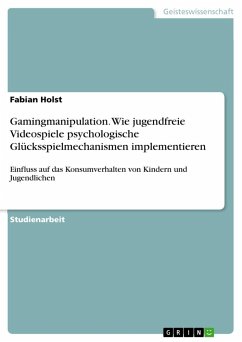Studienarbeit aus dem Jahr 2019 im Fachbereich Psychologie - Sonstiges, Note: 1,0, Leuphana Universität Lüneburg, Veranstaltung: Denn der Mensch ist nur da ganz Mensch, wo er spielt - Gesellschaft, Wissenschaft und Wirtschaft in Zeiten von Gaming und eSports, Sprache: Deutsch, Abstract: The present scientific discourse pursued the intention of examining the industries of the video game and gambling industry for a potential analogy relationship. As a result, subject-specific literature was extensively analysed, evaluated and validated as a result of empirical studies (Zendle et al. 2018). The existing causality between the acquisition of so-called random reward mechanisms (RRM's) in connection with problematic gambling behaviour is evident and more serious than the correlations observed in the past between problematic gambling and factors such as alcohol consumption, drug abuse and depression (Zendle et al. 2018).Using the case study of FIFA Ultimate Team(TM) (FUT), the psychological suggestion of the consumer was investigated against the background of the implementation of these mechanisms. The motivation of the company Electronic Arts Inc. (EA) was reflected as an economic guiding idea. Conclusions showed that these game mechanisms should be more strictly regulated, especially for young age groups, and that a revision of current legislation should be initiated. In view of the scientific discourse, the author intends to lay a foundation for further disputations and addresses in particular young gamers, their family members, educators, social researchers, psychologists and economists.Die kontroverse Thematik über die Verwandtschaft von Spieleindustrie und der Glücksspielbranche sorgte nicht erst mit Veröffentlichung des Spieles "Star Wars(TM) Battlefront(TM) II" für öffentliche Diskussionen . Bereits vor zwei Jahrzehnten sorgten Schlagzeilen wie "Sports Trading Cards: Wholesome Fun or Gambling?" für Kritik und Unverständnis in der Gesellschaft und warfendie Fragestellung auf, ob eine Analogie zwischen diesen beiden Industriezweigen bestehe . Frühzeitig erkannten Unternehmen das enorme Umsatzpotenzial dieses Geschäftsmodelles. Gemäß der New York Times (1999) realisierte eine amerikanische Mutter nach einem sechsmonatigen Zeitintervall, dass sie über 2000$ in die Pokémon-Sammelkarten ihres Sohnes investierte und behauptete infolgedessen, dass dieses Verhalten keine Modeerscheinung sei .
Hinweis: Dieser Artikel kann nur an eine deutsche Lieferadresse ausgeliefert werden.
Hinweis: Dieser Artikel kann nur an eine deutsche Lieferadresse ausgeliefert werden.








